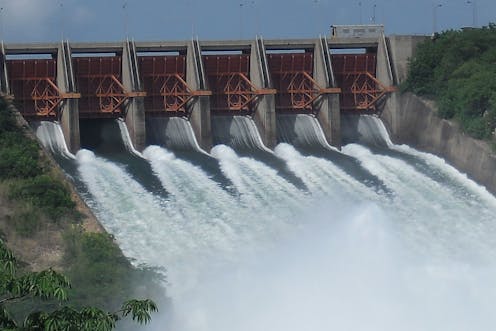
Recurring electricity supply crises in Ghana over an extended period have driven consumers to turn alternative sources of energy. In turn, this resulted in a sharp decline in demand for electricity.
Ghana has had several periods of power shortfalls, particularly in 1984, 1994, 1998, 2007 and 2012-2015. The reasons have been given as losses in the distribution system, a tariff structure that makes it difficult for electricity producers to recover their costs, and the non-payment of electricity bills by consumers.
Demand is always expected to increase due to factors like population growth, economic growth and increasing incomes. But demand can fall too. In Ghana, electricity demand or consumption increased from 10,583 gigawatt hours in 2013 to 10,695 gigawatt hours in 2014 but fell to 9,685 gigawatt hours in 2015 .
Ghana’s electricity supply fell by 12% in the period 2013-2015. In the same period, electricity demand declined by 8.49%. Demand from residential consumers fell the most: by 20.39%.
In our study we looked at the association between power crises and electricity demand in Ghana. We used data from 1980 to 2018 and in particular, the severe power crisis of 2012–2015. We found that power crises are sometimes followed by a fall in demand for electricity from the grid. Consumers appear to reconsider their sources of energy.
Our study results showed that the short term effects were smaller than the long-term effects. This suggests that the adverse impact of the crisis was so severe that economic agents did not respond only in the short term but also in the long term. This indicates that the over reliance on grid electricity was reduced forcing economic agents to resort to other alternatives.
Due to the adverse effects that power crisis has on economic agents, successive experiences of power crisis lead them to find long-term alternatives to reduce the impact of future power crisis. The switch to other alternatives has a potential financial impact on electricity consumers, especially for those switching to renewables such as solar energy whose costs continue to significantly decline.
The insights from our research into the effect of power crises on electricity demand provide planners with precise estimates based on scientific evidence.
The study also provides evidence for the need to pay equal attention to supply side policies. Over the years, Ghana has paid more attention to the demand side of electricity.
Big fall in demand
Our main data sources were the World Bank’s World Development Indicators, the Volta River Authority and Ghana’s Energy Commission.
We first considered the cumulative impact of all the power crises in Ghana (1984, 1997-1998, 2007-2008, 2012-2015) on electricity demand. Then we isolated the effect of the 2012-2015 crisis. Power crises in Ghana from 1984 to 2015 reduced electricity demand by 31.4% overall. The 2012-2015 crisis alone reduced demand by 27.6%, giving an indication of its severity.
Constraints on the power that could be supplied on the grid translated into lower demand for grid electricity. People could meet their potential demand from other sources such as solar and generators.
The demand reductions were huge, considering the key role of electricity in households, firms and industries and the associated spillover impacts on the economy.
The 2012-2015 power crisis was the most intense and protracted in the history of Ghana. It started with inadequate gas supply to power thermal plants and inability to supply electricity from hydro sources due to poor rainfall. At the end of 2011, Ghana’s electricity generation mix stood at 67% hydro sources against 33% thermal.
In 2012, the utility companies announced a power rationing programme which ended in 2015. At the peak of the rationing, customers were provided with an average of 12.5 hours of electricity every three days. Ghana experienced about 159 days of blackout in 2014 alone. To add to that, equipment failures sometimes caused unscheduled power outages.
Power crises in Ghana had several impacts on households, businesses, industries and the country at large. One estimate is that Ghana lost about 1.8% of its gross domestic product due to the 2007-2008 power crisis. Another finding was that the 2012-2015 power crisis reduced labour productivity and total productivity of small and medium manufacturing firms in Ghana.
There have not been any studies to establish exactly what caused households, businesses and industries to search for alternative sources of electricity. But supply crises may have been a factor in reducing demand for grid electricity.
Users took both short-term and long-term decisions to reduce their reliance on electricity in favour of alternative fuels. Our study did not measure the uptake of alternatives. But a decision to use alternatives would insulate users from the adverse effects of future power crises.
Some kinds of alternative fuels used in Ghana, such as kerosene lamps, crop residue and candles, can have serious environment and health implications.
Recommendations
Our study led us to make the following recommendations.
Government should not overemphasise demand side policies, but augment them with supply-side policies. In the past its focus has been on efforts to reduce peak electricity demand. This has included the Energy Commission and the Ministry of Energy rolling out several policies and standards designed to improve energy efficiency. Air conditioners, lighting and refrigeration appliances have all been subjected to regulations and standards.
Efforts should also be made to eliminate power crises, to give households, businesses and industries the confidence to rely on electric power. Policies and incentives for other sustainable sources of power such as renewable energy should be firmed up too.
And finally, it’s important to investigate the alternative sources of electricity that households and firms were switching to. They may have environmental and health implications.
Frank Adusah-Poku does not work for, consult, own shares in or receive funding from any company or organization that would benefit from this article, and has disclosed no relevant affiliations beyond their academic appointment.
This article was originally published on The Conversation. Read the original article.







